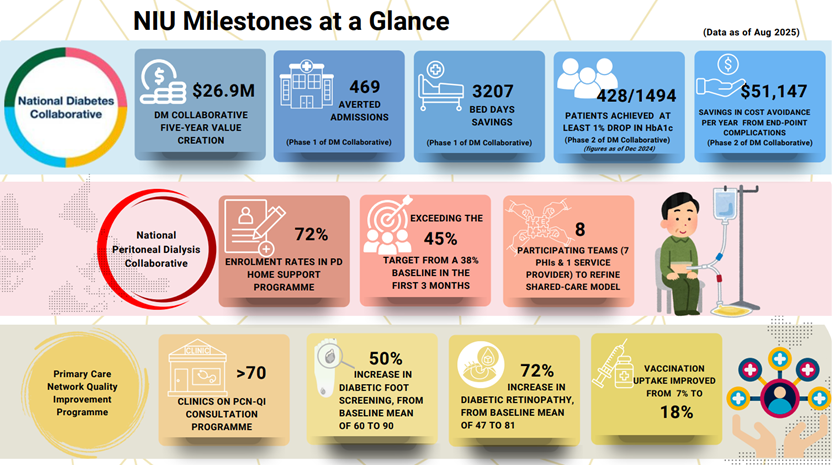National Improvement Unit
The National Improvement Unit drives quality improvement across Singapore’s healthcare system through collaborative initiatives and capability building.

Dr Eunice Wong
Head (National Improvement Unit)
Director
The National Improvement Unit (NIU) was set up in 2021 to drive sustainable and impactful quality improvement (QI) collectively in Clusters and Public Healthcare Institutions (PHIs). Its goal is to facilitate national scaling of successful improvement projects, aligning with the Ministry of Health (MOH)’s health system goals and national outcomes. NIU fosters collaborations, leverages data and implements innovative strategies that aim to enhance healthcare delivery and improve patient outcomes.

NIU Milestones at a Glance
Our Mission
NIU’s overarching mission is to build a resilient National Collective that enables sustainable improvements in achieving desired Health System Outcomes. The unit aspires to lead the advancement of healthcare quality in the application of Quality Improvement science across Singapore. By implementing evidence-based practices and fostering strategic partnerships, NIU is committed to drive excellence in every aspect of healthcare through innovative solutions and collaborative efforts with quality improvement (QI) leads, champions and teams in clusters, primary care networks and community partners. NIU also works towards creating a community of practice where support, development and cross-learning on quality improvement methodologies thrive.
Our partners:
Ministry of Health (MOH): Provides strategic direction and supports our initiatives in line with national health policies.
Regional Health Systems: Partners in collaborative project/implementing evidence-based practices and improving clinical outcomes.
Primary Care Networks (PCN): Works with NIU to enhance primary care services.
Agency for Integrated Care (AIC): Focuses on integrating care across various sectors and enhancing service delivery.
Current Initiatives
Driving Change Through Collaborative and Collective Learning

The National Diabetes Collaborative is one of NIU’s key initiatives aimed at combating the rising prevalence of diabetes in Singapore. Using the ‘Breakthrough Series’ model purported by the Institute for Healthcare Improvement, the Diabetes Collaborative initiative in Singapore was designed to tackle the challenges of diabetes management through a unified approach.
This collaborative effort brings together various Regional Health Systems (National Healthcare Group, National University Health System, Singapore Health Services) into one shared objective. The National Diabetes Collaborative has been implemented in two phases. Phase 1 focused on tertiary prevention by mitigating factors for patients with poorly controlled diabetes to reduce the high admission rates. This leads to change ideas such as establishing alternative care pathways and care processes.
Building on the positive results achieved in Phase 1 of the Collaborative, participating teams in Phase 2 focus on three primary drivers: (1) Shift the balance of power to patients; (2) Embed evidence-based medicine in routine practice; (3) Integrate with the community. Phase 2 expanded its focus from tertiary prevention to secondary prevention, moving upstream to improve HbA1c to address the longer-term goal of improving the care and management of diabetes and of delaying the onset of complications that often lead to diabetes-related hospital admissions.
Enabling Quality Improvement in Primary Care Network (PCN)

NIU, in collaboration with the Agency for Integrated Care (AIC), is working closely with Primary Care Networks (PCNs) to support quality improvement projects of GP clinics aligning with the Healthier SG goals. This initiative empowers PCNs to spearhead QI projects aimed at enhancing patient outcomes, streamlining care processes, and fostering healthier communities. By building the capability through providing QI training, coaching, resources and expertise, the programme enables PCNs to implement effective QI strategies, driving advancements in care delivery and contributing to the overarching objectives of Healthier SG.
This partnership ensures that primary care practices are equipped to meet evolving healthcare needs and deliver high-quality, patient-centred care. This initiative is part of Singapore’s broader strategy to enhance primary care and shift more healthcare services from hospitals to community settings.
NIU works closely with various PCNs on the following:
Quality Improvement Projects: Implementing projects designed to enhance care delivery and patient outcomes in primary care settings.
Training and Support: Offering workshops and resources for primary care providers to adopt best practices and improve service delivery.
Data-Driven Insights: Utilising data to identify gaps, measure progress and refine approaches to care.
Patient-Centred Care: Ensuring that improvements are aligned with the needs and preferences of patients.
Capability Building and Network Learning
![Thumbnail for CHATspire with Dr David Williams | MOHT [NIU]](https://i.ytimg.com/vi/JKVarIws8_4/hqdefault.jpg)

At NIU, tailored QI training and workshop are designed to meet the specific needs of the organisation. These learning and thematic sessions aim to transfer insights from various parts of the system, fostering sustained improvements and the adoption of transformational concepts.
In collaboration with the Institute for Healthcare Improvement (IHI), the Improvement Advisor Professional Programme is offered to enhance the capabilities of existing QI facilitators and coaches. This programme deepens their knowledge and skills, enabling them to serve as advisors to teams engaged in improvement initiatives. To further develop these skills, an Improvement Network was established, providing a regular platform for knowledge sharing, learning and relationship building among Improvement Advisors and other QI experts.
NIU Resources
NIU has put together a set of infographics and change packages that that highlight practical steps, tested interventions, and key insights from the teams on the ground.
